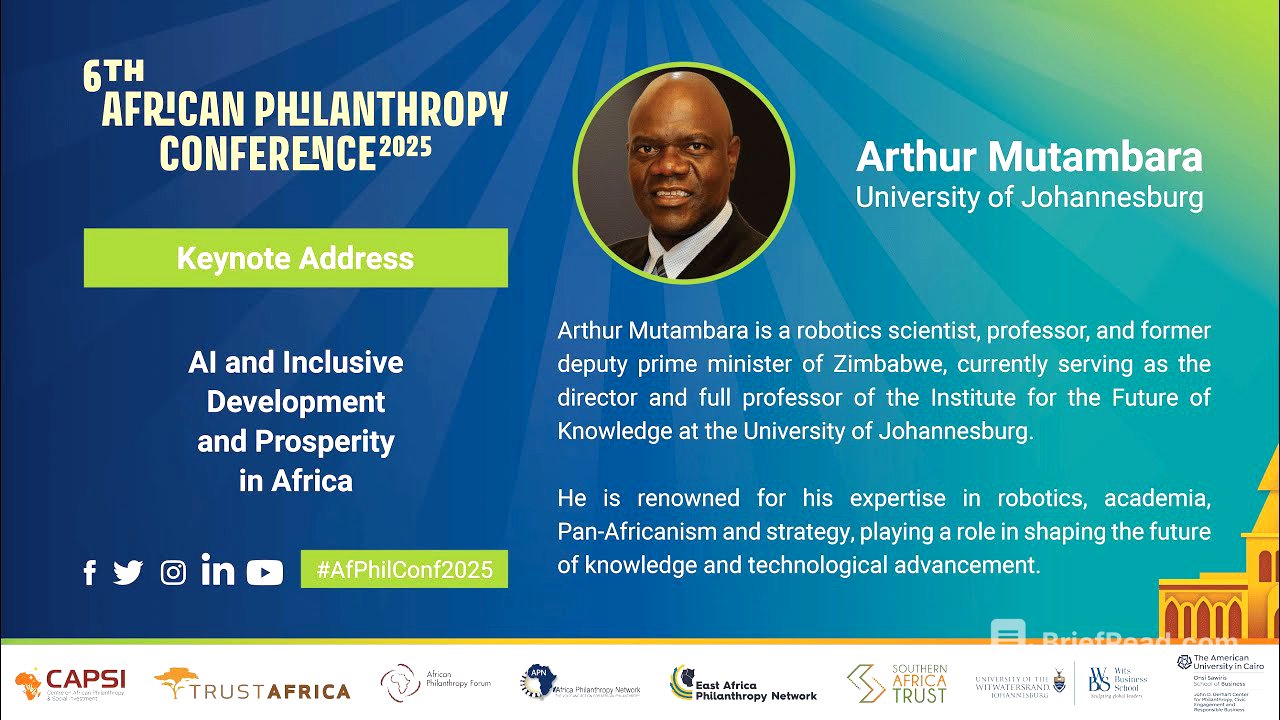TLDR;
This presentation discusses the transformative potential of AI for Africa, emphasising the need for Africans to take charge of the technology to drive inclusive development and shared prosperity. It addresses the importance of viewing Africa as a united continent and collaborating within the Global South to solve common problems. The talk highlights both the opportunities and risks associated with AI, including job displacement and ethical concerns, while advocating for the development of indigenous AI systems that reflect African values and interests. It also touches on the necessity of investing in digital infrastructure, education, and the semiconductor industry to fully leverage the economic benefits of AI.
- AI's transformative potential for Africa's development.
- The importance of African agency and collaboration within the Global South.
- The need for indigenous AI systems reflecting African values.
- The economic opportunities and risks associated with AI, including job displacement.
- The necessity of investing in digital infrastructure, education, and the semiconductor industry.
Introduction: The Transformative Potential of AI for Africa [0:05]
The speaker introduces the idea that AI technology is transformative and poses the question of how Africans can use it to improve their quality of life and solve problems. He stresses the importance of African agency in taking charge of this technology to drive inclusive development and shared prosperity, while acknowledging the potential dangers and risks. The focus should be on the potential of AI to make a difference in the lives of Africans, aligning with the conference's theme of sustainable finance for development in the majority world.
Understanding the Global South and Africa's Role [1:12]
The speaker clarifies the term "majority world" as the Global South, comprising emerging and least industrialised countries, which accounts for 6.6 billion of the world's 8 billion people. He emphasises the importance of Africa working together as a continent and collaborating with countries like China, India, and Singapore within the AI revolution. He highlights the collective strength of Africa, with its 1.4 billion people and a combined GDP of $3.4 trillion, and the African diaspora, representing 2.2 billion people and a $5 trillion economy.
Africa's Strengths and the Need for Value Addition [4:17]
The speaker encourages Africans to understand their strengths, including their vast land mass and mineral resources, as they embrace AI. He criticises the practice of selling minerals raw and suggests using AI for beneficiation and value addition to these resources. He also mentions leveraging remittances and stresses the importance of understanding the context and framework in which AI is being discussed.
Defining AI and Its Potential [5:28]
The speaker defines AI as the development and deployment of computer systems or machines that can perform tasks with human-like intelligence, including learning, problem-solving, and decision-making. He touches on the taxonomy of AI, including single-task AI, agendic AI, generative AI, and AGI, with a focus on super intelligence, where AI systems are smarter than the smartest human beings. He clarifies that while super intelligence is still a work in progress, significant advancements are being made.
Addressing the Problems and Dangers of AI [9:15]
The speaker acknowledges the problems and dangers associated with AI, including the potential for enforcing societal inequalities, vulnerability to breaches and misuse, ethical issues, fake news, disinformation, and hallucinations. He warns of the widening gap between the rich and the poor and the potential for data colonialism and digital imperialism. He stresses the importance of decolonising and democratising AI and highlights the dangers of the AI arms race and the competition between countries like Russia, China, and America.
The Importance of Building Indigenous AI Systems [10:56]
The speaker emphasises that AI systems are not neutral and that they often reflect the values and interests of their creators. He urges Africans to create their own AI systems that reflect their values and interests, rather than assuming that existing systems are neutral. He points out that in the AI revolution, there is no "Father Christmas" and that Africans must look after their own interests.
AI as Part of an Ecosystem and Its Economic Impact [12:44]
The speaker explains that AI must be understood as part of an ecosystem involving many technologies, including quantum computing and synthetic biology. He highlights the significant economic impact of AI, with generative AI alone contributing $4 trillion to global GTP this year. He attributes this to the staggering impact of AI on productivity, with Goldman Sachs reporting that 95% of work is now done by AI.
The Impact of AI on Jobs and the Need for New Skills [14:28]
The speaker addresses the impact of AI on jobs, noting that while some jobs will be displaced, most will be modified, and new jobs will be created. He stresses the importance of ensuring that the number of new and modified jobs is greater than the number of destroyed jobs in Africa. He identifies the new jobs needed in Africa, including data scientists, machine learning engineers, AI software engineers, and smart contract lawyers, and calls for the development of new skills, such as problem-solving, critical thinking, financial literacy, and AI skills.
Participating in the Semiconductor Industry [17:57]
The speaker emphasises the importance of not only creating AI systems but also participating in the semiconductor industry that produces the chips. He uses Nvidia as an example, highlighting its $4 trillion market cap and its role in producing GPUs, NPUs, and CPUs. He encourages Africans to partner and be part of this industry, leveraging their mineral resources in countries like the DRC, South Africa, and Zimbabwe.
Essential Requirements for AI Development in Africa [19:52]
The speaker outlines the essential requirements for AI development in Africa, including awareness, energy, digital infrastructure, computer resources, data, and cash. He points out the need for a national vision and strategy for AI in each country and suggests applications of AI in African philanthropy, such as data-driven decision-making, predictive analytics for impact, and personalised donor engagement.
Applications of AI in Various Sectors [21:36]
The speaker discusses the applications of AI in various sectors, including agriculture, mining, energy, manufacturing, education, and governance. He highlights the booming AI in agriculture market and the use of drones for better workflows and yields. He also acknowledges that AI is a double-edged sword, with applications in both beneficial areas and warfare.
Conclusion: Repositioning African Philanthropy [23:46]
In conclusion, the speaker emphasises that Africa must make AI work for its benefit through an ecosystem approach, using it to solve social, political, and economic problems. He stresses that AI should be embraced as an existential matter and that all efforts will rise or fall on leadership. He challenges the audience to reposition African philanthropy, emphasising that when Africans give to Africans, it is a strategic intervention rather than charity, and suggests using AI to enhance and sharpen that strategic intervention.









